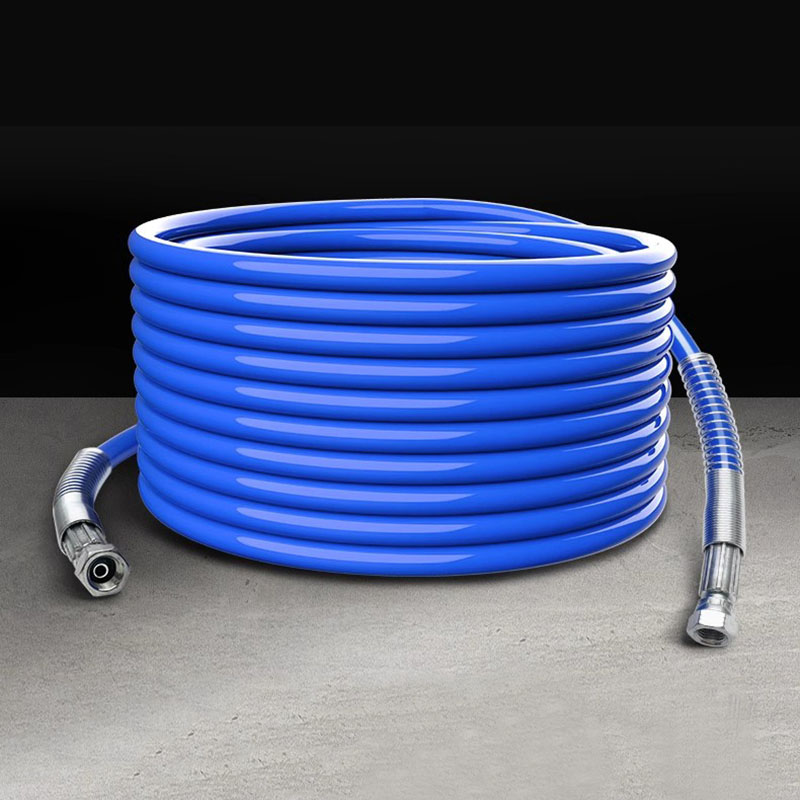Applications of Nylon Resin Hose
2024-05-22
A nylon resin hose, also known as a nylon hose or nylon tube, is a type of flexible tubing made from nylon resin. Nylon hoses are widely used in various industries for their excellent mechanical properties, chemical resistance, and versatility. Here's an overview of nylon resin hoses, including their features, benefits, applications, and considerations:
Features
1. Material:
- Nylon resin hoses are made from nylon polymers, which offer high strength, durability, and resistance to abrasion and impact.
2. Flexibility:
- Nylon hoses are flexible and can be easily bent, twisted, or routed around obstacles without kinking or collapsing.
3. Chemical Resistance:
- Nylon resin is resistant to a wide range of chemicals, oils, solvents, and fuels, making nylon hoses suitable for use in challenging environments.
4. Temperature Resistance:
- Nylon hoses can withstand a wide temperature range, from sub-zero temperatures to high temperatures, without losing their structural integrity.
5. Lightweight:
- Nylon resin hoses are lightweight compared to metal hoses, making them easier to handle and install in various applications.
6. Smooth Surface:
- The smooth inner surface of nylon hoses minimizes friction and pressure drop, improving flow characteristics and reducing energy consumption.
Benefits
1. Durability:
- Nylon resin hoses are highly durable and resistant to wear and tear, ensuring long service life even in demanding applications.
2. Versatility:
- Nylon hoses are suitable for a wide range of applications, including pneumatic systems, hydraulic systems, automotive fuel lines, chemical transfer, and air conditioning systems.
3. Safety:
- Nylon hoses are non-conductive, making them safe for use in electrical and electronic applications where conductivity could pose a risk.
4. Cost-Effectiveness:
- Nylon hoses are often more cost-effective than metal hoses and offer comparable performance, making them a preferred choice for many applications.
5. Ease of Installation:
- Nylon hoses are lightweight and flexible, allowing for easy installation, routing, and connection to fittings and equipment.
Applications
1. Pneumatics:
- Nylon hoses are commonly used for pneumatic applications such as air compressors, pneumatic tools, and pneumatic control systems.
2. Hydraulics:
- In hydraulic systems, nylon hoses are used for low to medium pressure applications, such as hydraulic fluid transfer, power steering, and brake systems.
3. Automotive:
- Nylon hoses are used in automotive fuel lines, vapor recovery systems, brake lines, and coolant lines due to their chemical resistance and flexibility.
4. Chemical Transfer:
- Nylon hoses are suitable for transferring a wide range of chemicals, acids, and solvents in industrial applications where compatibility with aggressive substances is required.
Considerations
1. Temperature Limitations:
- While nylon hoses have a wide temperature range, they may have specific temperature limitations depending on the application and the specific type of nylon resin used.
2. Compatibility:
- Ensure that the nylon hose is compatible with the fluids, gases, and chemicals being conveyed to prevent degradation or failure.
3. Pressure Rating:
- Nylon hoses have specific pressure ratings that should not be exceeded to prevent bursting or leakage.
4. UV Resistance:
- Nylon hoses may degrade when exposed to prolonged sunlight or ultraviolet (UV) radiation, so outdoor applications may require UV-resistant coatings or protection.
5. Fittings Compatibility:
- Ensure that the fittings used with nylon hoses are compatible and properly matched to prevent leaks or fitting failure.
Conclusion
Nylon resin hoses are versatile, durable, and cost-effective solutions for various fluid handling and transfer applications across multiple industries. Their excellent mechanical properties, chemical resistance, and flexibility make them a preferred choice for pneumatic, hydraulic, automotive, and chemical transfer applications. When selecting nylon hoses, consider factors such as temperature range, pressure rating, compatibility, and installation requirements to ensure optimal performance and longevity in your specific application.



